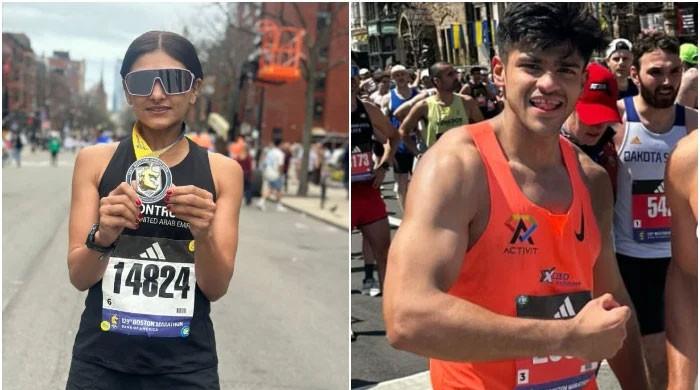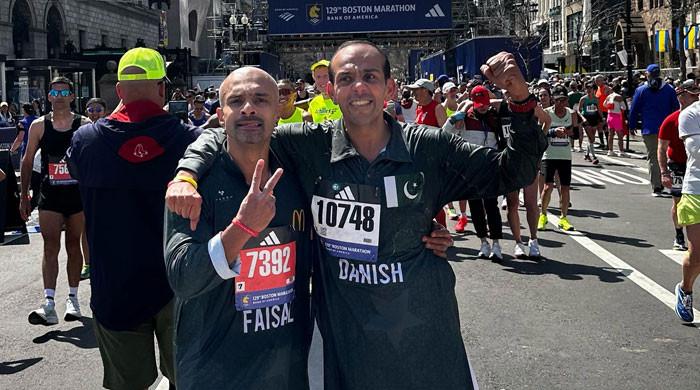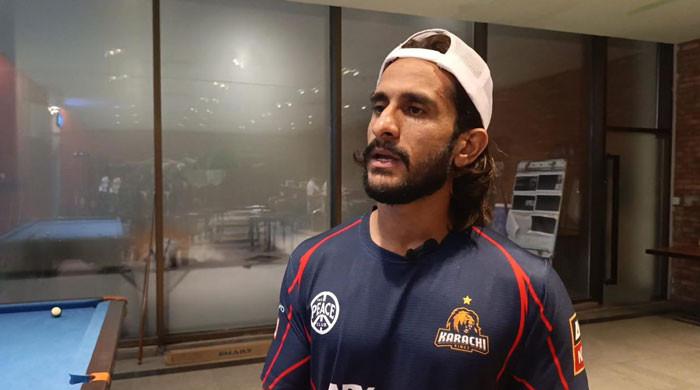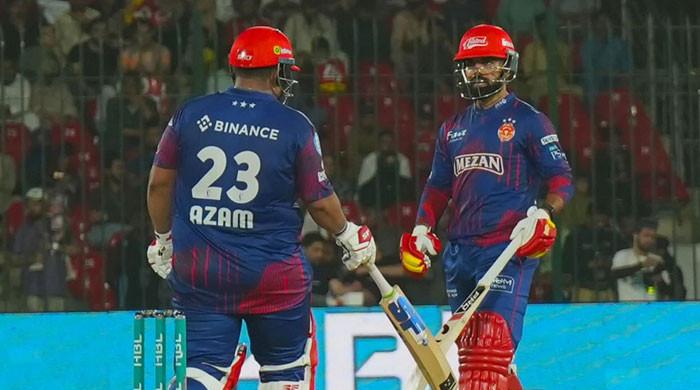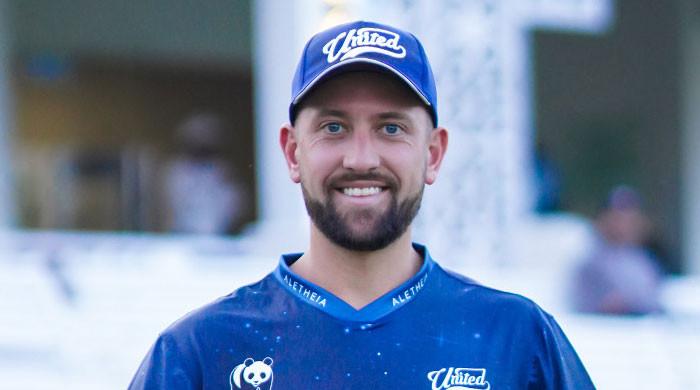South Asian women in sport: stories of grit and determination
Women athletes from across the South Asian region came together for an online discussion focusing on their challenges and wins
July 27, 2021
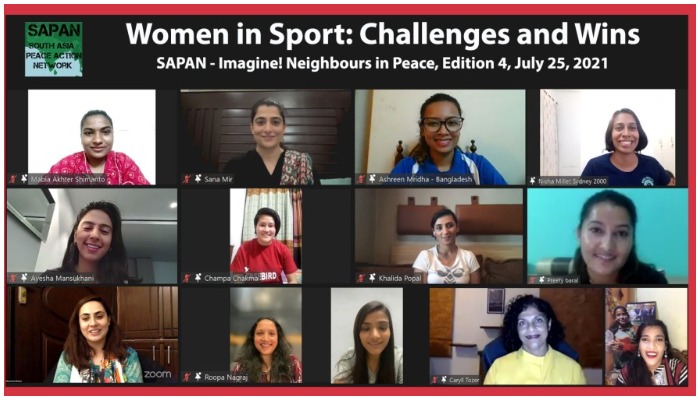
For many sports enthusiasts and activists across the globe, the Tokyo 2020 Olympics has served as a ray of hope with 49% participation from women, making it the most-gender balanced Games in history. But while the mega event has been exemplary in empowering women and girls this year, sportswomen in South Asia say they still have a long way to go to achieve equality in sport.
In this regard, a webinar was recently organised by the South Asia Peace Action Network (SAPAN), in collaboration with South Asian Women in the Media (SAWM), to bring together 13 sportswomen from South Asia who talked about the challenges they faced as women before making a mark in their respective sport.
The online panel discussion was hosted by journalists Aekta Kapoor and Beena Sarwar, while Pakistani sports journalist Natasha Raheel Khan and Athletes’ Rights advocate Dr Payoshni Mitra moderated the session.
The event kickstarted with an introductory session followed by a special appearance from renowned Pakistani actor Samina Ahmed who presented a skit by the satirist Shoaib Hashmi. Pakistani journalist and the former chairman of the Pakistan Cricket Board Najam Sethi also spoke at the online event.
![Image collage showing pictures of different athletes from South Asia, including [top left]Ayesha Mansukhani, Ashreen Mridha, Caryll Tozer, Champa Chakma, Gulshan Naaz, Khalida Popal, Nisha Millet and her twin daughters, Noorena Shams, and Ruhmana Ahmed. Photo: Screengrab via Zoom captured by the author.](https://www.geo.tv/assets/uploads/updates/2021-07-27/361964_5559935_updates.jpg)
The over two-hour-long event, filled with stories and solidarity, ended with ideas that include a book project and a South Asian women athletes association.
‘Getting up and fighting back’
During the panel discussion, the spirited athletes — most of who came from moderate backgrounds and small cities of India, Pakistan, Nepal, and Sri Lanka — shed light on how they excelled in sport despite all odds and what they learned from their experiences.
Speaking during the event, Indian athlete and sports investor Ayesha Mansukhani said that every girl, whether she wants to pursue it as a profession or not, should play sport to be able to learn a lifelong lesson: The ability to get up and fight back if they fall.
“I always wanted to promote sports among women from all areas of society to experience the benefits of playing, whether they can make it to fancy leagues or not,” she said. “Every time you lose in sports, there is only one thing to do: get up, dust it off, get back in the ring, try harder, run faster, jump higher, hit harder, and dive deeper.”
She said that if such a resilient attitude is inculcated in women from a young age, they learn what to do whenever they face losses later in life, irrespective of the nature of the loss. “Get up, get back in, and fight – and that’s the reason why I love to promote sports among women.”
Breaking the gender divide
Mansukhani also spoke about the stereotypical image of women found in all South Asian societies. She criticised the media for promoting the idea that traits like fair skin, being size zero, and being a sex symbol are essential to gaining the approval of society.
“There is more to women than living up to the role of a sex symbol [because] that’s not the kind of message we want to send to our daughters,” she said, adding that young girls should be taught to become strong and resilient instead of holding on to the ideals of being fair and lovely.
Mansukhani’s sentiments were echoed by award-winning Bangladeshi weight-lifting champion Mabia Akhter Shimanto, who – despite having a very supportive family – was questioned by the wider society for not assuming traditional roles assigned to women. She spoke about how people used to stare at her and even criticised her for her sports attire.
"Sports was a God-gifted power. When I was a child, I always wanted to play sports but back then I had to fight to be included in the traditionally “boys” sports. And even now, I have to fight to get selected,” Shimanto said.
Adding to the conversation, Olympian swimmer Nisha Millet from India urged women to get back into the game even after leaving the competitive sport, to contribute to raising the next generation of sportswomen through coaching, mentoring, promoting, and other such efforts.
Resilience and courage
For Khalida Popal, the former captain of the Afghanistan Women’s National Football Team, being a sportswoman was not only a challenge because she belonged to a patriarchal society but also because of the war in her country.
“War has taken away everything from us,” lamented Popal, adding that she decided to take up football as a full-time profession because someone had to take a step.
![Image collage of athletes, hosts, moderators, and guest speakers, including [top left] Preety Baral, Roopa Nagraj, Sana Mir, Mabia Akhter Shimanto, Natasha Raheel Khan, Dr Payoshni Mitra, Beena Sarwar, Aekta Kapoor, and Najam Sethi. Photo: Screengrab via Zoom captured by the author.](https://www.geo.tv/assets/uploads/updates/2021-07-27/361964_3841942_updates.jpg)
“I was harassed, criticised and attacked but didn’t give up because my fight was not just for myself, but it was for my sisters and all other women in my country,” she said. “South Asia is like our home. Our pain is the same. What’s missing is unity.”
Like Popal, international squash player Noorena Shams, the first-ever international female athlete from Malakand Division in Pakistan’s north-western region, also grew up in conflict. She, however, defied all odds and continued doing what she loved the most despite suffering from the trauma of the war.
“I can still hear the bombs,” she said, adding that she expected to die and never thought she would play squash, especially at an international level.
Shams said that while she takes a lot of pride in being the first-ever female from her region to become an athlete, being the only one also upsets her.
“Why am I the only one? Why don’t other girls come forward?” she questioned, adding that in her case, it was not only luck but a lot of hard work that allowed her to make it to the mainstream sports industry.
The squash player also pointed out that in a region where even accessing education is a struggle for girls, playing a game was naturally harder.
“I disguised myself as a boy to play cricket in Peshawar,” she said. “…South Asians should continue to be there for each other. It is not about the trophy or who did it first. We have to do it together and be there for each other.”
Fighting discrimination
Many participating athletes also spoke about the discrimination they had to endure in the field of sports.
Gulshan Naaz, award-winning para-athlete from Saharanpur, a small town in the Indian state of Uttar Pradesh, said her abilities were questioned because of being partially blind.
“No one wanted to sponsor a blind runner,” said Naaz. “[Whenever my name came up for consideration] people at authoritative positions questioned as to what a person with a disability could do.
Akin to Naaz, Bangladeshi cricketer Champa Chakma spoke of being bullied and discriminated against for belonging to an indigenous tribe. “It’s unjust,” Chakma said while narrating her ordeal.
Caryll Tozer, activist and former netball player from Sri Lanka testified to the prevalent discrimination in the sports industry. She spoke about sexism, dehumanising phobias, systemic gender-based discrimination, and the abusive treatment of women athletes.
“In our region, women are expected to take a back seat, whereas male athletes are revered all across South Asia,” she said.
'Women are set up to fail'
Almost all the participating athletes complained of a lack of funding for women’s sports in their countries, adding that they had to struggle to make ends meet. Some of them even had to look for side jobs.
Ashreen Mridha, a national basketball player from Bangladesh, said most women are hesitant about becoming full-time athletes because there is no money, adding that she had had her fair share of financial struggles throughout her career.
Ruhmana Ahmed, captain of the women’s cricket team in Bangladesh, also highlighted the challenges female athletes still face when it comes to funds.
“Women must prove themselves to get funds,” she said.
Preety Baral, a national tennis player from Nepal agreed and said that playing sport as a woman is itself a challenge.
“Challenges related to [funding] do not apply to our male counterparts. Our countries have failed to recognise our potential by entirely focusing on men’s teams,” Baral said, adding that sports boards do not want to invest in female players because of the assumption that women won’t continue their careers once they get married or become mothers.
Meanwhile, men are financially supported even if they do not perform well or win, said Sana Mir, former captain of the Pakistan women’s cricket team.
"In Pakistan, women still don't have the facilities to play sport while simultaneously supporting their families,” she said. “In many cases, finances are there but we are told they are not there. Women were set up to fail, whereas men cricketers are given everything."
Roopa Nagraj, cricketer, coach, and former India A team player seconded Mir and said that finding a job is one of the biggest challenges for female athletes in South Asia.
Objectification of women and sexual harassment
Towards the end of the event, Najam Sethi spoke about different issues that women athletes in South Asia face and highlighted two further concerns: the objectification of women and sexual harassment – both of which deserve more attention.
“I am struck by the grit and determination of these sportswomen in very difficult circumstances, and how smilingly they narrated their ordeals, he said, adding that the stories he heard at the discussion deserve to be in a book. The Sapan team agreed to work on the project.
The idea of a South Asian women athletes’ association floated at the event also found traction among participants.
Noted educationist Baela Raza Jamil read out the Sapan Charter calling for a visa-free South Asia with ease of trade, tourism, and travel during the event. She invited attendees to join the growing list of people across the region who have endorsed the Charter.





